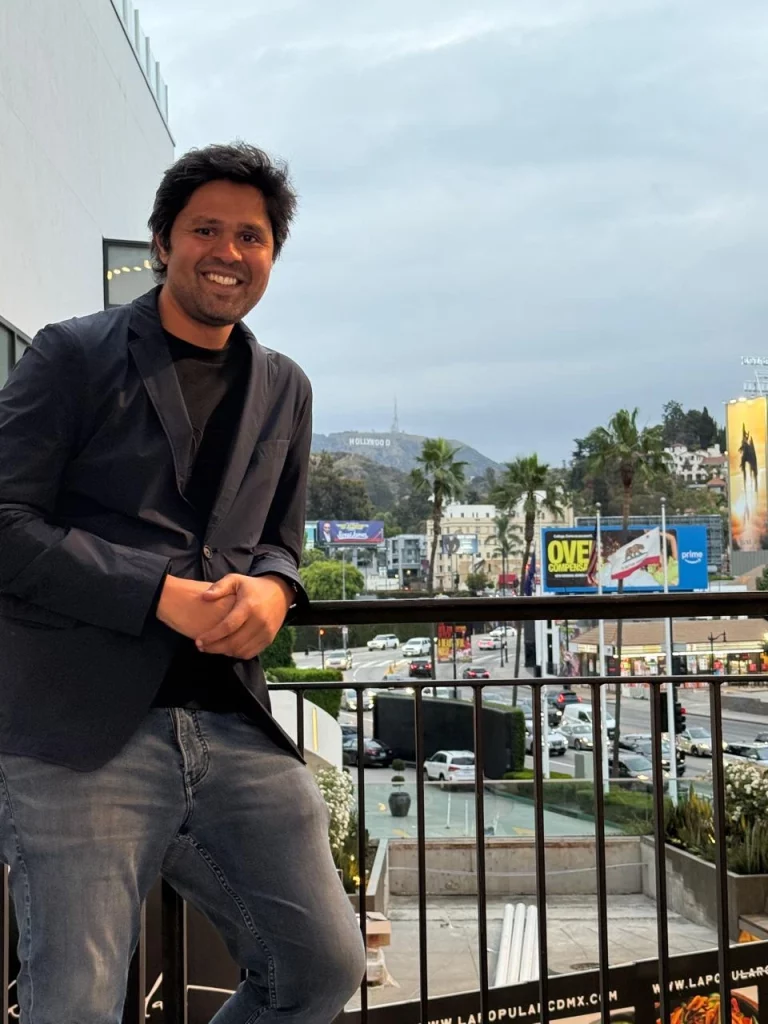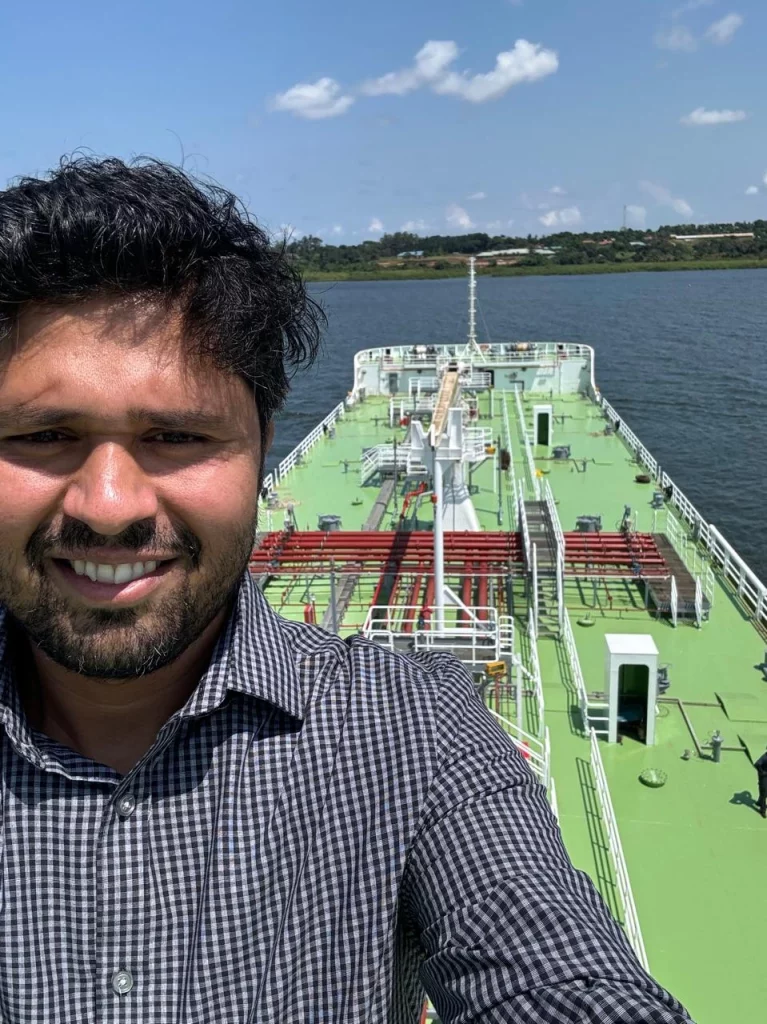(November 27, 2025) In an era when entrepreneurship is often romanticised as a playground of pitch decks, accelerators, and linear growth models, Kalyan Swaroop’s story unfolds with refreshing simplicity. His journey does not begin with an elaborately crafted business plan or lofty ambition to build a multinational Engineering, Procurement & Construction (EPC) enterprise. Instead, it emerges from a series of unexpected openings, instinctive decisions, and a powerful belief that movement creates clarity. Today, as Director of Mahathi Infra Services Pvt Ltd.the entrepreneur oversees large-scale engineering, marine, oil and gas, and infrastructure projects across India and several African countries. Amidst Kalyan’s entrepreneurial growth story, his guiding philosophy remains grounded. “If your idea has potential and profitability and can scale, think less, act more,” he remarks in a conversation with Global Indian. His principle has been entirely shaped by lived experiences.

Kalyan Swaroop on site at one of Mahathi Infra’s projects
A beginning without a blueprint
The origins of Mahathi Infra go back to 2010. Nothing about its formation was premeditated. “My father is an ex-IOC employee. We started our entrepreneurial journey after I finished college. Our business did not have a planned beginning,” Kalyan reflects. At the time, he had recently completed his MBA from IMT Ghaziabad and was gaining experience at Idea Cellular and later at KPMG. Corporate life taught him discipline and structure, but the turning point came when his father, Y Ravi Shankar encountered an unusual opportunity that demanded a leap of faith.
“A team from Mozambique, a country in Southern Africa, approached my father, who was working with IOC at the time, saying they needed a contractor to build a port. The companies they had spoken to were quoting very high prices, and even the contractor they selected couldn’t provide the required bank guarantee. So my father simply told them, ‘Give the project to me if you are not getting anyone.’ They released an advance, and that’s how our journey began,” says the entrepreneur. He adds with a smile, “It was a very big amount of money for us at that time, and I didn’t even know where Mozambique was. I had to look it up on the map.”
His father resigned from his secure job and ventured into entrepreneurship almost impulsively. It was a leap taken more out of instinct than deliberation. And Kalyan followed. Their entry into the business came with no preparation and no strategic planning. “We built that port. Then we did three more projects in Mozambique. We stayed there for few years.” Those early years, defined by on-ground learning, improvisation, and relentless work, shaped Kalyan’s entrepreneurial instincts far more deeply than any management classroom could.

Kalyan Swaroop
Trial by Crisis: The Liberia turning point
If Mozambique taught them how to build, Liberia taught them how to endure. In 2014, while executing an iron ore construction project for ArcelorMittal, Mahathi Infra suddenly found itself at the epicentre of the Ebola outbreak — one of the deadliest viral epidemics in West Africa, marked by high fatality rates and widespread panic. The company had between 400 and 500 employees on the ground, and overnight, safety and evacuation became the only priority. Work came to a halt, revenue streams froze, and the young company’s future became painfully uncertain.
“Then we got a project in Liberia for iron ore construction in 2014, Ebola time. We executed that project. Then we came to Gabon and worked there for many years,” he says. The Liberia experience could easily have crippled Mahathi Infra. Instead, it became the crucible that sparked one of the company’s most transformative ideas.
A spark that improved Uganda’s fuel economy
During internal discussions, they began examining inefficiencies in fuel transportation across Lake Victoria in East Africa. The idea did not emerge from strategy documents, but from observation, curiosity, and a willingness to explore the unknown. That seed eventually grew into the multi-million-dollar fuel logistics ecosystem the company later built in Uganda. “In Uganda, we got a chance to build our own port. We went on to build the port, the ships, the oil facilities — all of it,” says the entrepreneur.
The impact of that decision continues to define Uganda’s energy landscape. “The project we did in Uganda is a pan-regional project. We have our own ships. We now supply 50 percent of the country’s fuel. We reduced their fuel transportation cost by 50 percent, and because of that, the public can get fuel at lower costs. That’s the impact we want to create.” What began as a crisis-triggered idea ultimately transformed the fuel economy of an entire region.

Kalyan Swaroop at one of Mahathi Infra’s ships in Uganda
A leadership style rooted in action, not noise
Across continents and sectors, the Hyderabad-based entrepreneur operates with a style grounded in movement. He often speaks of the need to eliminate anxiety through action. His days require him to shift constantly between micro-level operations and macro-level decisions, sometimes within the span of a few hours.
Yet despite leading strategic, high-value infrastructure projects, Kalyan prefers a low profile. “I like to stay quiet, low profile. The more noise you make in strategic projects, the more yardsticks people will put. In Uganda, until the project was nearly over, 90 percent of people didn’t even know such a big project was happening. We keep a low profile.” In a sector where visibility can attract scrutiny and political complications, silence becomes a strategy.
Understanding Africa from the ground up
Kalyan’s relationship with Africa is neither superficial nor transactional. Over the last 14 years, he has travelled to more than 30 African countries, learning their cultures, political systems, regulatory environments, and industrial needs from the ground.
Africa, he explains, is often misunderstood from afar. On the ground, he discovered a mix of stability, warmth, and hunger for sustainable development. “These are countries with different political stability. We work in places with different cultures and regulatory frameworks.”
His deep engagement opened doors that most companies never access. “Our work has a huge entry barrier. In oil and gas, you have to deal with the world’s biggest oil companies likeTotal and Shell as well as governments. We meet important people in every country. We understand their economic problems and address import substitution. We suggest: don’t import, make it yourself.” This mindset shapes the Mahathi Infra’s presence across Africa, not just as a contractor, but as a partner in industrialisation.

An image from the past: Ugandan President Yoweri Museveni in a meeting with Y. Ravi Shankar, MD of Mahathi Infra Services Pvt. Ltd., his son Kalyan Swaroop and their team
Building infrastructure that transforms economies
Mahathi Infra’s problem-solving approach has attracted institutional backing. “We have a big African sovereign fund invested in us. They are a developmental financial institution, investing in member countries for development. They also try to invest with us in newer initiatives. That’s how we spread our growth story in Africa.” The company’s operational philosophy is clear: they pursue work that lifts larger systems, not just balance sheets.
A specialised EPC organisation with global capabilities
As Mahathi Infra grew, it transformed into a specialised EPC organisation with advanced engineering capabilities. The company holds ASME U, S, PP and R Stamps, enabling the manufacturing of critical pressure vessels, boilers, and engineered industrial products. Its facilities use automated welding, robotic systems for large-surface painting, and digital and VR-powered simulations. These tools support the execution of highly technical projects spanning oil and gas terminals, marine infrastructure, pipelines, port structures, nuclear installations, and renewable energy assets. The organisation’s group entities—Mahathi Infra Uganda Ltd, Mahathi Storage Terminals Ltd and AGR Ventures Pvt. Ltd enables it to function seamlessly across continents.

Mahathi Infra’s oil jetty at Matola, the largest suburb of the Mozambique capital, Maputo
Localising workforce and building ecosystems
One of Mahathi Infra’s defining principles is creating local opportunities. “Around 60 percent of our manpower is local in every site. Civil work is done locally—cement, sand, aggregate. Skilled jobs are from India. If a site has 1000 people, 300 are Indians, 700 locals.” The India model is similar. “In India, even in the Rajasthan refinery, out of 1000 people, around 500–600 are local. The local ecosystem has to support us,” Kalyan remarks.
Across African countries, the company now works with around 500 staff members and a workforce of 4000–5000. Their projects inevitably influence surrounding communities—schools, hospitals, vendors, markets because energy and industrial assets cannot exist in isolation.
Kalyan’s approach is rooted in humility. “Everybody around you should grow. This is one of the reasons for our success. We come from a modest background. We know what it is like.” It is a philosophy that aims for inclusive development rather than extraction.
The father–son partnership at the core
Despite the global presence, at the centre of their success story remains the partnership between Kalyan and his father. Their entrepreneurial journey began when Kalyan was just 25, and merely ten days into his marriage.
The father-son’s dynamic is built on debate, mutual respect, and unified decision-making. They critique each other privately but present a united front publicly. Their modest upbringing in a government-service home continues to influence their values, even as they build strategic national assets across continents.
A partner in every sense
Kalyan acknowledges his wife Himani’s pivotal role in his rise as an entrepreneur. “My wife has been very instrumental in my corporate journey. She quit her corporate job so that I could start my career and has been a pillar for me ever since, and also has carried a lot of luck for me,” he mentions.
The two studied engineering together in the same college in Delhi. Himani, originally from Agra, later completed her management education at SP Jain. Today, Kalyan sees her unconditional support as a quiet force that has shaped both his career and their shared journey.
Moving forward with a grounded philosophy
Today, Kalyan Swaroop remains committed to practical execution, long-term thinking, and building infrastructure that strengthens communities and economies. For young entrepreneurs, his advice is based on the worldview that built his own path: “If your idea has potential and profitability and can scale, think less, act more.”
Kalyan Swaroop’s journey is not one of overnight success or meticulously engineered strategy. It is a story of movement, of learning through challenges, of solving real-world problems, and of uplifting entire ecosystems along the way.
- Follow Kalyan Swaroop on LinkedIn
ALSO READ: Rizwan Adatia: The Indian-African entrepreneur’s big moves in business and philanthropy



